Blowfly Sugar Perception Lab Report
This lab report explores the sensory perception of different sugars by blowflies. Conducted by Alexander Hamilton, it investigates the response of Sarcophaga bullata to various sugar concentrations. The findings demonstrate how flies use taste receptors to choose nutritious food.
Edit, Download, and Sign the Blowfly Sugar Perception Lab Report
Form
eSign
Add Annotation
Share Form
How do I fill this out?
To fill out this lab report, begin by gathering data from your experimental observations. Document your results clearly in each section provided, ensuring all information is accurate. Finally, review the report for completeness and clarity.
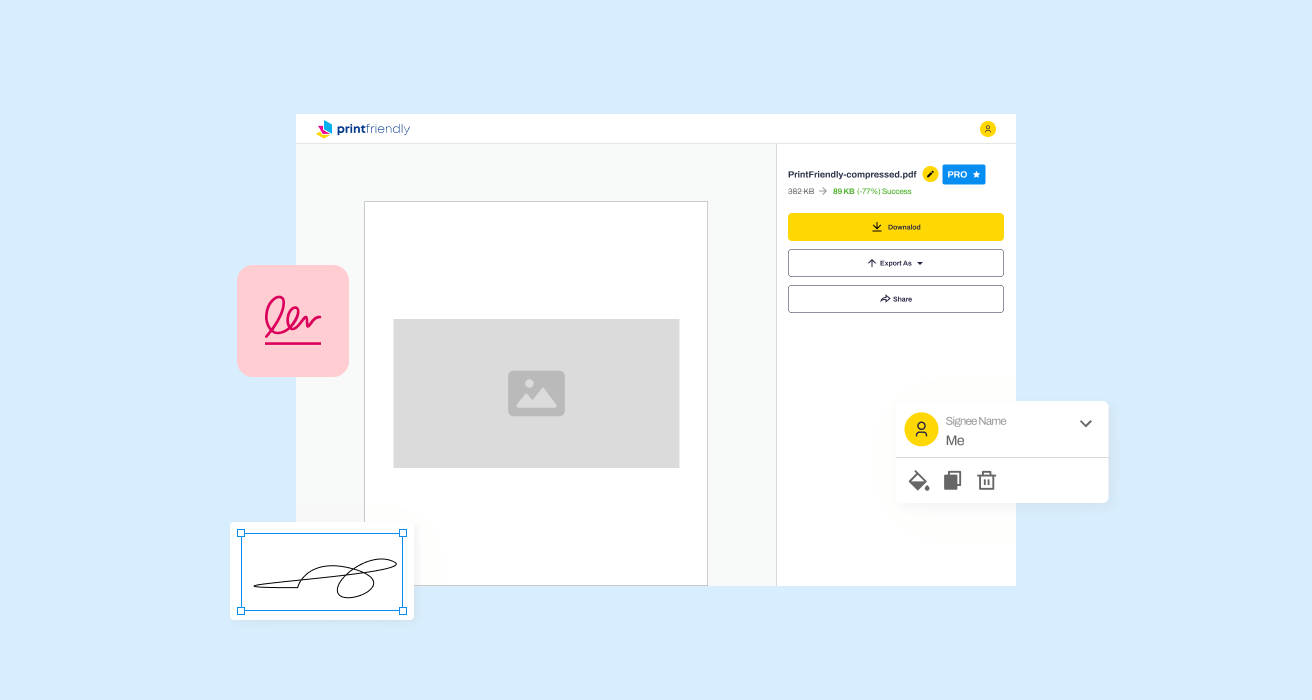
How to fill out the Blowfly Sugar Perception Lab Report?
1
Gather all necessary experimental data.
2
Document observations in the appropriate sections.
3
Include detailed descriptions of methods and results.
4
Review the report for accuracy and completeness.
5
Save or print the report for submission.
Who needs the Blowfly Sugar Perception Lab Report?
1
Biology students who need to submit lab reports.
2
Teachers grading student experiments.
3
Research teams conducting similar experiments.
4
Graduate students preparing research documentation.
5
Academic publications requiring lab findings.
How PrintFriendly Works
At PrintFriendly.com, you can edit, sign, share, and download the Blowfly Sugar Perception Lab Report along with hundreds of thousands of other documents. Our platform helps you seamlessly edit PDFs and other documents online. You can edit our large library of pre-existing files and upload your own documents. Managing PDFs has never been easier.

Edit your Blowfly Sugar Perception Lab Report online.
Edit this PDF on PrintFriendly by first uploading the report into our editor. You can then highlight text to modify or add annotations as needed. Finally, save your revisions for future access and submission.

Add your legally-binding signature.
Signing this PDF on PrintFriendly is easy; simply use the signature tool to add your mark where required. Ensure that your signature appears clear and is correctly placed. Once done, save your signed document in the desired format.
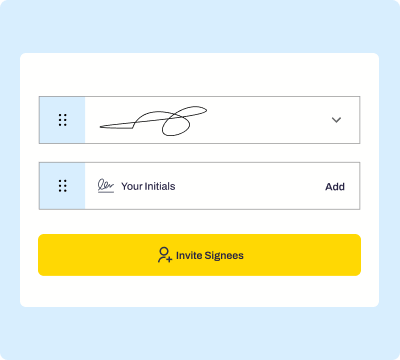
Share your form instantly.
With PrintFriendly, sharing your PDF is straightforward. Use the share options to send the report via email or directly through social media platforms. You can also create a link to share, making access convenient for others.
How do I edit the Blowfly Sugar Perception Lab Report online?
Edit this PDF on PrintFriendly by first uploading the report into our editor. You can then highlight text to modify or add annotations as needed. Finally, save your revisions for future access and submission.
1
Open the PDF using PrintFriendly's editor.
2
Select the text or section you want to edit.
3
Make necessary changes using editing tools.
4
Review your edits to ensure accuracy.
5
Download the updated PDF after editing.

What are the instructions for submitting this form?
To submit this lab report, ensure you have completed all sections accurately. You may send the finalized report via email to your instructor at example@example.com, fax it to 123-456-7890, or upload it via the school's submission portal. For physical submissions, address them to the biology department office at 123 Science Lane, City, State, 12345. It’s advisable to keep copies for your records.
What are the important dates for this form in 2024 and 2025?
Important dates for this form in 2024 and 2025 are as follows. Students should adhere to submission deadlines specified by their instructors. Ensure all findings are submitted by the end of each academic term to maintain compliance with project timelines.
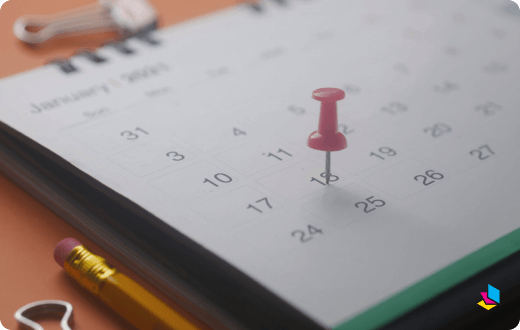
What is the purpose of this form?
The purpose of this lab report form is to document experimental findings regarding the taste perception of blowflies (Sarcophaga bullata). This report allows students to represent their methodologies, results, and analyses clearly and concisely. It serves as an educational tool to enhance understanding of sensory biology and experimental design principles.
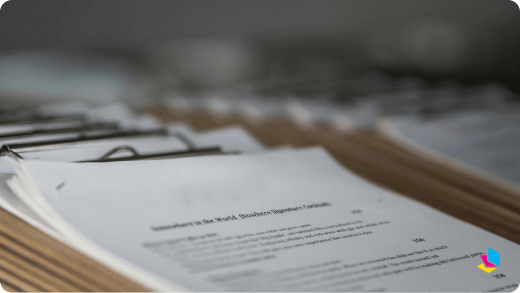
Tell me about this form and its components and fields line-by-line.

- 1. Title: The title of the lab report.
- 2. Abstract: A brief summary of the experiment.
- 3. Methods: Details on how the experiment was conducted.
- 4. Results: Findings from the experiment.
- 5. Conclusion: The interpretation of results.
What happens if I fail to submit this form?
Failure to submit this lab report may result in loss of credit for the assignment and hinder your academic progress. It's important to adhere to submission deadlines to ensure evaluation of your findings.
- Loss of Academic Credit: Not submitting your report will prevent you from receiving any points.
- Delayed Feedback: You won't receive feedback on your experiment without a submission.
- Impact on Group Projects: If this report is part of a larger group project, the entire team may be affected.
How do I know when to use this form?

- 1. For Academic Assignments: This form is essential for students fulfilling lab report requirements.
- 2. For Research Documentation: Researchers can utilize this format to publish their experimental findings.
- 3. For Educational Purposes: Educators may use this to teach students about scientific reporting.
Frequently Asked Questions
How can I edit my PDF?
You can edit your PDF by uploading it to PrintFriendly and using our editing tools to modify text.
How do I save my edited PDF?
After editing, simply download the updated document to your device.
Can I sign my PDF using PrintFriendly?
Yes, you can easily add your signature within the editor before downloading.
How do I share my PDF?
Share your PDF using email or social media options provided in the editor.
What file formats can I download my PDF in?
You can download your PDF in standard PDF format from PrintFriendly.
Can I work on my PDF later?
Currently, all changes must be saved and downloaded as you cannot save projects in PrintFriendly.
What types of PDFs can I edit?
You can edit any PDF document uploaded to PrintFriendly.
Is editing safe with PrintFriendly?
Yes, you can comfortably edit your PDFs online, focusing on usability.
Do I need an account to use PrintFriendly?
No, an account is not required to edit PDFs on PrintFriendly.
How do I contact support for PrintFriendly?
You can reach out via the contact page on the PrintFriendly website for any issues.
Related Documents - Flies Sugar Lab Report
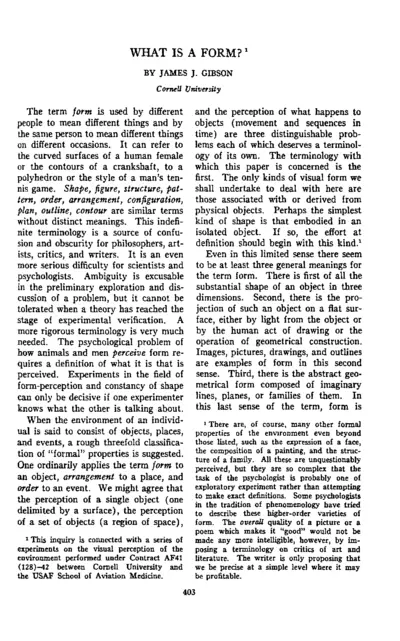
Understanding Form and Form-Perception by James J. Gibson
This document explores various definitions and theories of form, emphasizing the need for precise terminology. It delves into experiments related to the visual perception of form, distinguishing between solid and surface forms. The text critiques traditional views and presents new perspectives on form-perception.
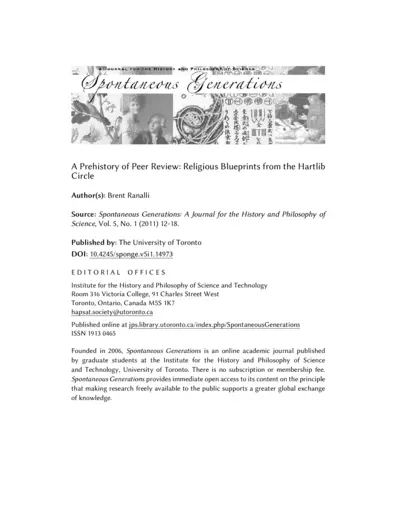
Prehistory of Peer Review: Religious Blueprints
This file explores the origins and development of peer review in science, tracing its roots to religious scholars in the Hartlib circle. It discusses the influence of the Royal Society of London and other early scientific organizations. The content is based on extensive historical research and analysis.
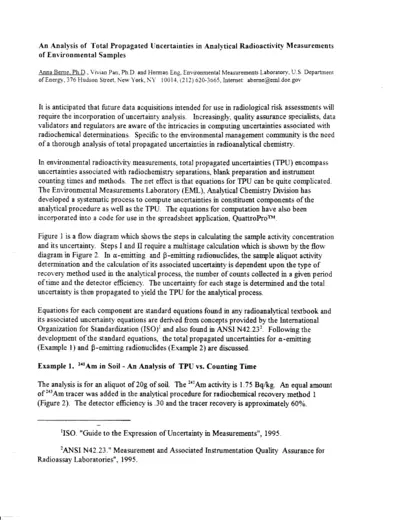
Analysis of Uncertainties in Radioactivity Measurements
This document discusses the uncertainties in analytical radioactivity measurements of environmental samples. It includes detailed equations and methods for calculating total propagated uncertainties. Useful for quality assurance specialists, data validators, and radiochemical analysts.
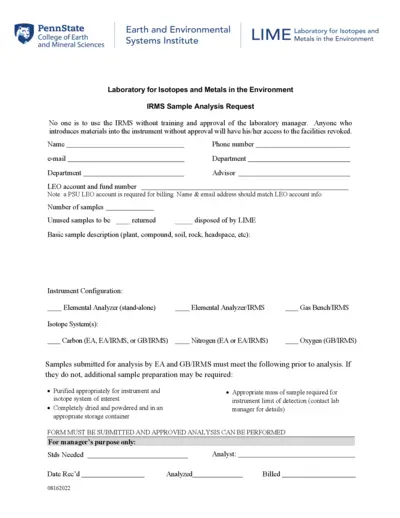
IRMS Sample Analysis Request Form Guidelines
This file contains instructions and details about the IRMS Sample Analysis Request Form. It is used to request sample analysis in the Laboratory for Isotopes and Metals in the Environment. Ensure you have the required approvals before using the IRMS.
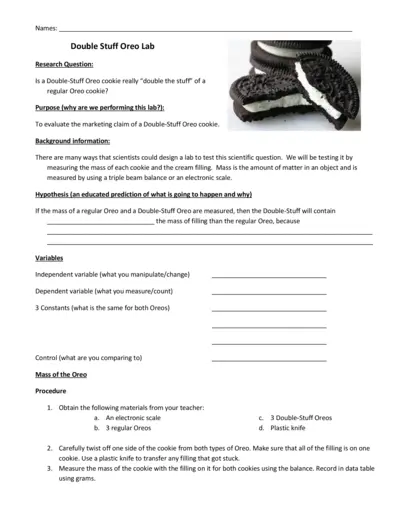
Double Stuff Oreo Cookie Science Experiment
This file contains details and instructions for conducting a science experiment to evaluate the marketing claim of Double-Stuff Oreo cookies. Users will measure the mass of regular and Double-Stuff Oreo cookies along with their fillings. It guides users through the process of data collection, calculation, and analysis using the scientific method.
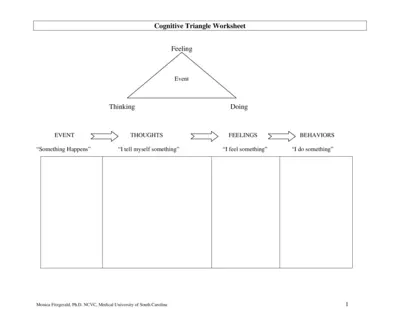
Cognitive Triangle Worksheet Instructions and Details
This file provides an overview and detailed instructions on how to use the Cognitive Triangle Worksheet. It helps users understand the relationship between their thoughts, feelings, and behaviors. Perfect for those interested in cognitive-behavioral strategies.

Engaging Doctor Pretend Play Printables for Kids
Transform playtime with free doctor pretend play printables designed for kids. These fun tools foster creativity and learning through imaginative play. Perfect for children from toddlers to first graders.
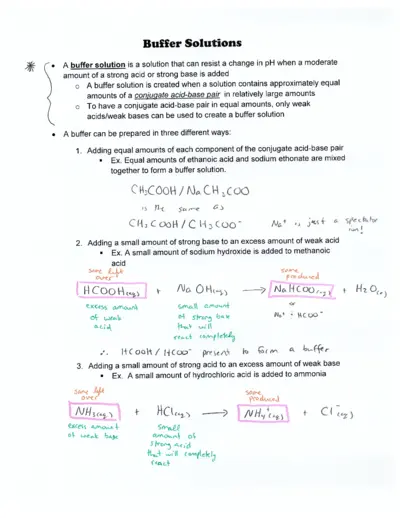
Buffer Solutions: Understanding Their Functionality
This file provides comprehensive insights into buffer solutions, including their preparation and pH resistance mechanisms. Ideal for chemistry students and professionals seeking to understand buffer systems. Practice problems included for hands-on learning.
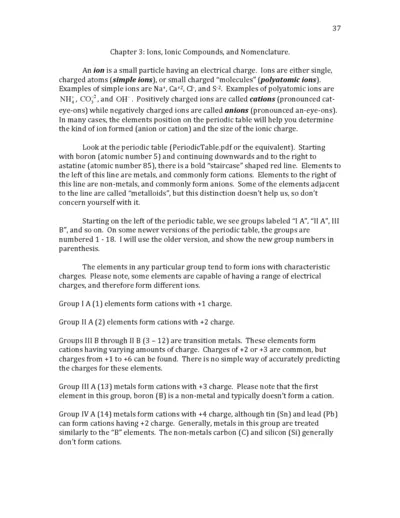
Ions and Ionic Compounds: Understanding Nomenclature
This file provides a comprehensive overview of ions, including their types, charges, and nomenclature rules. It covers essential details such as simple and polyatomic ions, and how to name them correctly. Perfect for students and professionals looking to deepen their understanding of ionic compounds.
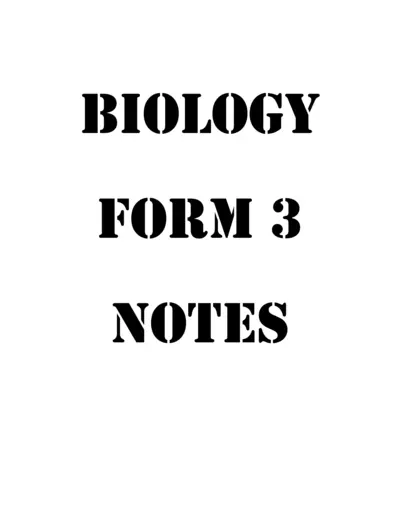
Biology Form 3 Notes and Instructions
This file contains detailed biology notes for Form 3 students. It covers essential topics such as organism classification and characteristics of various kingdoms. Perfect for studying and exam preparation.
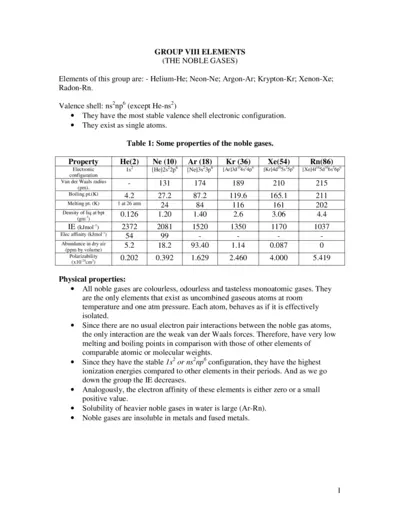
Noble Gases Properties and Chemical Behavior
This document provides a comprehensive overview of the noble gases, their properties, and chemical behaviors. It includes information on individual gases, their electronic configurations, and compound formations. Ideal for students and professionals in chemistry.
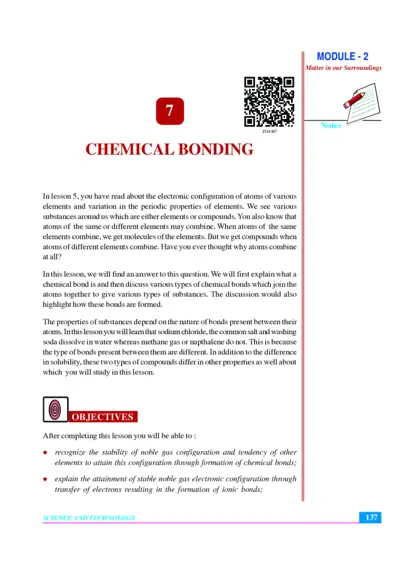
Chemical Bonding and Matter in Our Surroundings
This file provides detailed insights into chemical bonding, including ionic and covalent bonds. It covers the principles of matter in our surroundings and the electronic configurations of elements. Ideal for students and educators in chemistry to enhance their understanding.